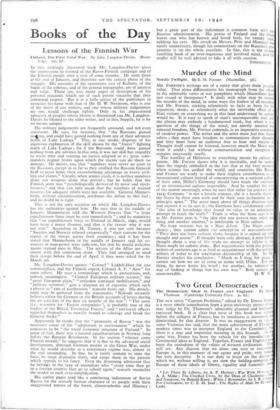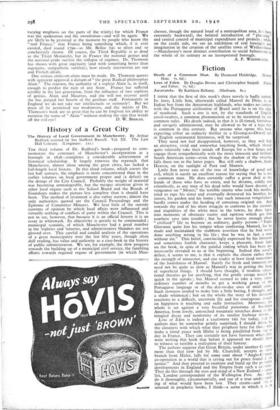Two Great Democracies .
The Democratic ideal in France and England. By David Thomson. (Cambridge University Press. 3s. 6d.) THE new series " Current Problems," edited by Dr. Ernest Barker, is a most timely contribution frizzin a great university press—if on may judge by Dr. Thomson's admirably planned and brilliant] executed book. It is clear that most of this book was value before the collapse of France, but its timeliness is increased, nog diminished, by that disaster. It was an exaggeration to say, a some Victorian has said, that the main achievement of France it modern times was to interpret England to the Continent, but there is a true and important meaning in this boutade. In tlg same way, France has been the vehide for the introduction of Continental ideas to England. Together, France-and England hay been the custodians of the values of western civilisation. Th still are. Any illusion that we alone can save or reconstru Europe is, in this moment of our agony and pride, very nat but very deceptive. It is our duty to insist on the degree which we, without willing it, are now the holding-company f. Europe of those ideals of liberty, equality and fraternity * Let There Be Liberty, by A. P. Herbert ; War With Honour, A. A. Milne ; The Crooked Cross, by the Dean of Chichester ; S and Nazarene, by Ronald Knox ; When I Remember, by J. R. Clyne, For For Civilisation, by C. E. M. load ; The Rights of Man, by 1-1Jrc"' Laski. varying emphasis on the parts of the trinity) for which France was the spokesman and the swordsman—and will be again. We are likely to be pestered at the moment by people who know the " real France," that France being something which, if it ever existed, died round 1790—as Mr. Belloc has so often and so conclusively shown. Of course, the Third Republic is as dead as the Third Monarchy, but in France the national genius and the national pride survive the collapse of regimes. Dr. Thomson has shown with great ingenuity (and with something better than ingenuity, sympathetic subtlety), how closely interwoven are our and French ideals.
One serious criticism alone must be made. Dr. Thomson quotes with apparent approval a dictum of " the great Radical philosopher Alain." The renown, the authority of a sophist Alain is, in itself, enough to predict the ruin of any State. France has suffered terribly in the last generation, from the influence of two sophists of genius, Alain and Maurras, and she will not recover until she has purged her bosom of the perilous stuff. Fortunately in England we do not take our intellectuals so seriously! But we must all be permitted our weaknesses, and the merits of Dr. Thomson's book are so great that he can be forgiven his ability to mention the name of " Alain " without making the sign that wards



























 Previous page
Previous page